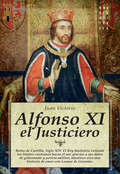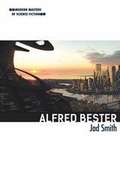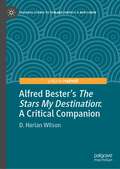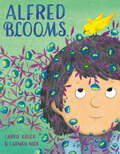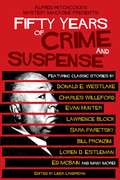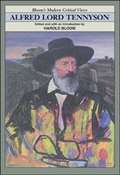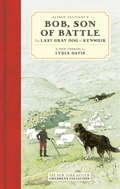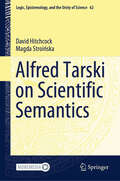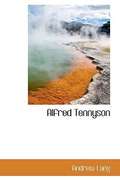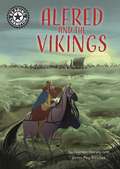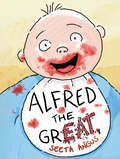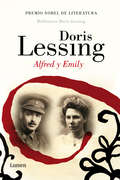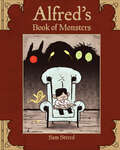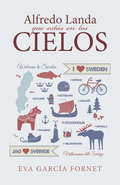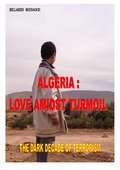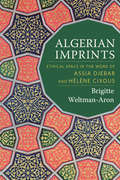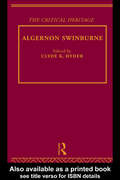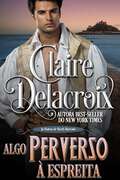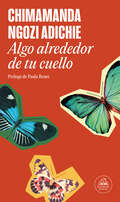- Table View
- List View
Alfonso XI, el Justiciero (Historia Incógnita)
by Juan VictorioEn 1312 muere Fernando IV y la corona pasa a su hijo Alfonso XI que tiene apenas un año de edad. Mientras crece, Castilla conoce una de las etapas más negras de su historia debido a la rapacidad de la alta nobleza, que se había encargado de su tutoría.
Alfred Bester
by Jad SmithAlfred Bester's classic short stories and the canonical novel The Stars My Destination made him a science fiction legend. Fans and scholars praise him as a genre-bending pioneer and cyberpunk forefather. Writers like Neil Gaiman and William Gibson celebrate his prophetic vision and stylistic innovations. Jad Smith traces the career of the unlikeliest of SF icons. Winner of the first Hugo Award for The Demolished Man , Bester also worked in comics, radio, and TV, and his intermittent SF writing led some critics to brand him a dabbler. In the 1960s, however, New Wave writers championed his work, and his reputation grew. Smith follows Bester's journey from consummate outsider to an artist venerated for foundational works that influenced the New Wave and cyberpunk revolutions. He also explores the little-known roots of a wayward journey fueled by curiosity, disappointment with the SF mainstream, and an artist's determination to go his own way.
Alfred Bester’s The Stars My Destination: A Critical Companion (Palgrave Science Fiction and Fantasy: A New Canon)
by D. Harlan WilsonIn this comprehensive study of The Stars My Destination, D. Harlan Wilson makes a case for the continued significance of Alfred Bester’s SF masterwork, exploring its distinctive style, influences, intertextuality, affect, and innovation as well as its extensive metafictional properties. In Stars, Bester established himself as a son of the pulp-SF and high-modernist writers that preceded him and a forefather to the New Wave and cyberpunk movements that followed his lead. Wilson’s study depicts Bester as an SF insider as much as an outlier, writing in the spirit of the genre but breaking with the fixation on hard science in favor of psychological interiority, literary experimentation, and adult themes. The book combines close-readings of the novel with broader concerns about contemporary media, technoculture, and the current state of SF itself. In Wilson’s view, SF is a moribund artform, and Stars foresaw the inevitable science fictionalization of our benighted world. With scholarly lucidity and precision, Wilson shows us that Stars pointed the way to what we have (un)become.
Alfred Blooms
by Carrie KruckShy Alfred wants to befriend the girl whose yard is filled with other kids and flowers but he doesn't know how. When Alfred sees Lulu&’s magical yard filled with flowers and friends, he&’s sure that if he can cultivate a beautiful garden, friends will flock to join him. Alfred tries but nothing grows in his brown patch of dirt. Determined to make one last attempt, Alfred heads to the store to buy fresh flower seeds. As he hurries home, he sneezes—and the seeds fly everywhere! And this time they begin to grow wherever they land—in his pockets, in his hair, even in his ears! A very discouraged Alfred gets stuck in the mud. But the aroma of warm blueberry muffins coming from a nearby bakery reminds him of Lulu&’s favorite treat and, tucking the flowers under his hat, he heads there. Alfred shares muffins with Lulu and finds out that he doesn&’t need a garden; time spent together is the best way to make a friend. This charming friendship story is sensitive and delightful with just a touch of whimsy.
Alfred Hitchcock Presents: Stories That Scared Even Me
by Alfred Hitchcock17 short stories by a variety of authors, the novelette It by Theodore Sturgeon, and the novel Out of the Deeps by John Wyndham.
Alfred Hitchcock's Home Sweet Homicide
by Cathleen JordanThe top names in mystery fiction come together in an anthology of home-based crime stories that derive from adultery, inheritance, and other family situations.
Alfred Hitchcock's Most Wanted
by Cathleen Jordan21 short stories from Alfred Hitchcock's Mystery magazine, 1980-1985.
Alfred Hitchcock's Mystery Magazine Presents Fifty Years of Crime and Suspense
by Linda LandriganFrom Ed McBain to Sara Paretsky: a celebration of over fifty years of mystery masterworks. For over fifty years, Alfred Hitchcock’s Mystery Magazine has been one of the foremost magazines of mystery and suspense. This celebratory anthology features such bestselling writers as Lawrence Block, Ed McBain, and Jan Burke, just three of the esteemed contributors to have appeared in the magazine’s pages over the past five decades. This impressive anthology reflects the diversity of every issue of the magazine: historicals and police procedurals, cozies and noirs, humor and suspense. From Jim Thompson in the fifties and Donald Westlake in the sixties, to recent stories by S. J. Rozan, Martin Limon, and Rhys Bowen, this anthology documents over a half century of superb storytelling.
Alfred Hitchcock's Shrouds and Pockets
by Cathleen JordanThis book is a collection of 29 short stories written by different authors representing Alfred Hitchcock's genre.
Alfred Hitchcock's The Shadow of Silence
by Cathleen JordanThis book is a collection of 28 short stories written by different authors representing Alfred Hitchcock's genre.
Alfred Lord Tennyson
by Harold BlooomEssays by T. S. Eliot, G. M. Young, Cleanth Brooks, Marshall McLuhan, Robert Langbaum, Christopher Ricks, John Rosenberg, John Hollander, Harold Bloom, A. Dwight Culler, and Robert Bernard Martin.
Alfred Ollivant's Bob, Son of Battle
by Alfred Ollivant Lydia Davis Marguerite KirmseBob, Son of Battle, is a sheepdog so canny and careful of his flock, so deeply devoted to his master, James Moore, and so admired for his poise and wisdom by the residents of a small village in the rugged mountains of England's North Country, that young though he is, he is already known as Owd Bob. In a recent contest, Bob has proved himself a matchless sheepdog, and if he wins the trophy two more times, he'll be seen as equal to the legendary sheepdogs of yore. But Bob has a real rival: Red Wull, with his docked tail and bristling yellow fur, a ferocious creature, just like his diminutive master, Adam McAdam, a lonely Scot, estranged not only from his English neighbors but from his son, David. McAdam just can't stop belittling this strapping young man, all the more so since David began courting Moore's beautiful daughter Maggie. But what McAdam really wants is for his beloved Wullie to wrest the prize from Bob once and for all. The story takes a darker turn when a troubling new threat to the local flocks emerges. A dog has gone rogue, sneaking out at night to feast on the flesh and blood of the sheep he is bound to protect. Again and again, new sheep fall prey to this relentless predator; again and again, he slips away undetected. This master hunter can only be among the boldest and sharpest of dogs . . . Bob, Son of Battle has long been a beloved classic of children's literature both in America and in England. Here the celebrated author and translator Lydia Davis, who first read and loved this exciting story as a child, has rendered the challenging idioms of the original into fluent and graceful English of our day, making this tale of rival dogs and rival families and the shadowy terrain between Good and Bad accessible and appealing to readers of all ages.
Alfred Tarski on Scientific Semantics (Logic, Epistemology, and the Unity of Science #62)
by David Hitchcock Magda StroińskaThis book tells the story of the landmark event in modern logic whereby Alfred Tarski became “the man who defined truth”. Alfred Tarski’s classic monograph on truth became known internationally in 1935, when he presented its ideas in German at an international conference and collaborated in preparation of its German translation. This book provides the first English translation of the Polish version of Tarski’s conference paper, which for purposes of comparison is printed side-by-side with a new exact English translation of the German version. It offers for the first time a comprehensive and detailed analysis of the paper, and for the first time a description and analysis of the discussion of the paper immediately after its presentation. It discusses 22 substantive differences between the two versions. The book also extracts from recently discovered correspondence about the German translation of the truth monograph how it was decided to produce such a translation, the process of vetting and changing the translation, changes requested by Tarski, objections to the appeal to intuition in the Polish original (supported by a list of those appeals with their replacements in the German and English translations), other translational issues, discrepancies other than those concerning appeals to intuition between the Polish original and its German translation, the “Keystone cops” saga of Tarski’s off-prints, and monetary matters. It lists from Tarski’s journal his skiing, mountaineering and tourist trips in 1935, and describes his companions on those trips. An electronic supplement translates or summarizes the complete correspondence, with comments, and includes images from Tarski’s journal of his itineraries of his 1935 trips, with the editors' explanatory comments.
Alfred Tennyson
by Andrew LangINTRODUCTION. IN writing this brief sketch of the Life of Tennyson, and this attempt to appreciate his work, I have rested almost entirely on the Bio- graphy by Lord Tennyson with his kind per- mission and on the text of the Poems. <P> <P> As to the Life, doubtless current anecdotes, not given in the Biography, are known to me, and to most people. But as they must also be familiar to the author of the Biography, I have not thought it desirable to include what he rejected. The works of the localisers I liave not read Tennyson disliked these researches, as a rule, and they appear to be unessential, and often hazardous. The professed commentators I have not consulted. It appeared better to give ones own impressions of the Poems, unaffected by the impressions of others, except in one or two cases where matters of fact rather than of taste seemed to be in question. Thus on two or three points I have ventured to differ from a distinguished living critic, and have given the reasons for my dissent. . .
Alfred and the Vikings: Independent Reading 18 (Reading Champion #455)
by Damian HarveyWhen Vikings arrive and invade, King Alfred summons the Anglo-Saxons to fight. This true story of the famous defeat of the Vikings is brought to life through the eyes of Alfred's squire, who witnesses Alfred's bravery first hand.This first colour chapter book is a perfectly levelled, accessible text for Key stage 2 readers aged 10-11 or in year 6. Reading Champion offers independent reading books for children to practise and reinforce their developing reading skills.Fantastic, original stories are accompanied by engaging artwork and activities to provoke deeper response and encourage writing. Each book has been carefully graded so that it can be matched to a child's reading ability, encouraging reading for pleasure.The Key Stage 2 Reading Champion Books are suggested for use as follows:Independent Reading 11: start of Year 3 or age 7+Independent Reading 12: end of Year 3 or age 7+Independent Reading 13: start of Year 4 or age 8+Independent Reading 14: end of Year 4 or age 8+Independent Reading 15: start of Year 5 or age 9+Independent Reading 16: end of Year 5 or age 9+Independent Reading 17: start of Year 6 or age 10+Independent Reading 18: end of Year 6 or age 10+
Alfred the Great
by Seeta AngusBaby Alfred loves his food, But too much of anything isn’t good! Chocolate mice may be his treat, But is there something magical in that sweet? Alfred is a baby whose tummy grows at an alarming rate, but Mum and Dad just keep feeding him. Read the story and laugh at this funny tale, full of silly nonsense and overflowing with bottles of milk and food! Be on the lookout in the near future for Katherine the Great, Alfred’s baby sister, coming soon!
Alfred y Emily
by Doris LessingDoris Lessing ha querido rendir un homenaje a sus padres, imaginando qué hubiera sido de su vida si la Primera Guerra Mundial no hubiese truncado el porvenir de la joven pareja. El peso del conflicto fue como un castigo que planeó sobre la pequeña Doris desde su infancia, "Aquí estoy intentando escapar de esta monstruosa herencia, intentando ser libre", escribe la autora. Para conseguirlo, en la primera parte del libro Lessing inventa para sus padres una vida donde no hubiera existido la guerra, y en la segunda cuenta cómo fue su vida en realidad, primero en Inglaterra y luego en África, intercalando en las páginas del texto unas viejas fotos familiares."Si ahora pudiera conocer a Alfred y Emily sin la pesadilla de la guerra, creo que estarían contentos de la vida que he imaginado para ellos", acaba diciendo Lessing en estas páginas.Ficción y autobiografía a la vez, acertada amalgama de imaginación y recuerdos, la novela más reciente de esta gran narradora demuestra una vez más el talento de una mujer que, a sus noventa años, sabe describir su propia vida como si de un cuento se tratara."Se supone que, llegados a cierta edad, dejamos de innovar, pero Doris Lessing es excepcional y nos sorprende una vez más."The Guardian
Alfred's Book of Monsters
by Sam StreedTrick or treat?With nods to Tim Burton, Edward Gorey, and Neil Gaiman, this humorous picture book about a Victorian boy obsessed with monsters presents a dark and appealing world, created by debut author/illustrator Sam Streed.In the graveyard, between stone monuments for forgotten souls, lurks the Black Shuck. . . . Its one blood-red eye burns with an undying rage.After reading about the slimy Nixie, the angry Black Shuck, and the creepy Lantern Man in his beloved Book of Monsters, Alfred decides to invite the monsters to teatime with his crusty old aunty, who thinks monsters are an improper obsession for a respectable young boy.
Alfredo Landa que estás en los cielos
by Eva García FornetNovela de la emigración y del desarraigo. Los países escandinavos analizados desde cerca. Tragicomedia de unas vacaciones. <P><P> Un padre visita a su hija emigrante en la nueva Suecia muy lejos ya del paraíso socialdemócrata de épocas anteriores.
Algeria: The Dark Decade of Terrorism (Novel #1)
by Bellaredj BoudaoudIn this story, the author denounces religious fanaticism, assassins, attacks, intolerance, hypocrisy and even a total incomprehension of Islam. A religion that preaches peace and not violence. Generally speaking, violence is inherent in human nature. It takes a commendable effort to suppress it. Our father Adam had two sons: one killed the other. Monotheistic religions strive to neutralize tendencies towards violence through patience, piety and love of neighbor. The author portrays here a realistic and sometimes picturesque image of the life of a people he loves, plunged into the chaos of history, with its violence and dangers, its hopes and passions. Little by little, the truth and exactitude of the details, the non-documentary precision, A religion that preaches peace and not violence.
Algerian Imprints: Ethical Space in the Work of Assia Djebar and Hélène Cixous
by Brigitte Weltman-AronBorn and raised in French Algeria, Assia Djebar and Hélène Cixous represent in their literary works signs of conflict and enmity, drawing on discordant histories so as to reappraise the political on the very basis of dissensus.In a rare comparison of these authors' writings, Algerian Imprints shows how Cixous and Djebar consistently reclaim for ethical and political purposes the demarcations and dislocations emphasized in their fictions. <P><P>Their works affirm the chance for thinking afforded by marginalization and exclusion and delineate political ways of preserving a space for difference informed by expropriation and nonbelonging. Cixous's inquiry is steeped in her formative encounter with the grudging integration of the Jews in French Algeria, while Djebar's narratives concern the colonial separation of "French" and "Arab," self and other. Yet both authors elaborate strategies to address inequality and injustice without resorting to tropes of victimization, challenging and transforming the understanding of the history and legacy of colonized space.
Algernon Swinburne: The Critical Heritage
by Clyde K. HyderThe Critical Heritage gathers together a large body of critical sources on major figures in literature. Each volume presents contemporary responses to a writer's work, enabling students and researchers to read for themselves, for example, comments on early performances of Shakespeare's plays, or reactions to the first publication of Jane Austen's novels. The carefully selected sources range from landmark essays in the history of criticism to journalism and contemporary opinion, and little published documentary material such as letters and diaries. Significant pieces of criticism from later periods are also included, in order to demonstrate the fluctuations in an author's reputation. Each volume contains an introduction to the writer's published works, a selected bibliography, and an index of works, authors and subjects. The Collected Critical Heritage set will be available as a set of 68 volumes and the series will also be available in mini sets selected by period (in slipcase boxes) and as individual volumes.
Algo Perverso à Espreita (As Noivas de North Barrows #1)
by Claire DelacroixSete anos atrás, Sophia Brisbane perdeu tudo: seu pai, seu irmão, a fortuna da família, mas pior, foi rejeitada pelo homem que amava. Ela está determinada a não ansiar pelo passado, nem por seus prazeres, até encontrar Lucien de Roye outra vez. Embora ele soubesse que Sophia jamais poderia ser dele, Lucien jurou recuperar a herança desperdiçada dela. Mesmo que através de um acordo com um demônio, em que ele cede a própria alma. Quando Sophia descobre o que ele fez, nenhuma força no céu ou na terra vai convencê-la a deixá-lo pagar o que deve ao demônio, não importa o custo para si.
Algo alrededor de tu cuello
by Chimamanda Ngozi AdichieEl escritor nigeriano Chimamanda Ngozi Adichie, a solo treinta y un años de edad, ha ganado una extraordinaria reputación, junto con el Premio Orange y una beca MacArthur, en la fuerza de sus dos primeras novelas, Purple Hibiscus y la mitad de un Sol Amarillo.La cosa alrededor de su cuello, su primera colección de cuentos cortos, demuestra que tiene Chimamanda corto de ficción tan seriamente como lo hace la novela. No se trata de tomas o salidas en falso de las novelas de pasado o por venir, o ejercicios de los dedos por un autor relajante en medio de grandes proyectos. Las historias de pie por su cuenta. Sus personajes son tan intrigantes como los de las novelas, y aunque estas historias no son especialmente largos, hay algo importante en juego en cada uno.
Algo alrededor de tu cuello (edición especial limitada)
by Chimamanda Ngozi AdichieChimamanda Ngozi Adichie, autora ganadora del prestigioso premio Orange con su novela Medio sol amarillo, vuelve al territorio de la ficción con este volumen de cuentos, un libro que revela una voz madura crecida en la realidad de un país como Nigeria. -Edición especial limitada con prólogo de Paula Bonet- Conmovedores y profundos, estos relatos cuentan historias humanamente cercanas y geográficamente remotas: historias de mujeres que sufren lejos de su país de origen, historias de emigrantes que se encuentran a sí mismos en América, la tierra prometida. Chimamanda Ngozi Adichie, autora nigeriana, sabe hablar de África alejándose de los titulares manidos sobre ese continente, pero sin dejar de lado la historia de su país. Es una escritora interesada en cómo los asuntos públicos afectan a los individuos, interesada en analizar desde la ficción el choque entre la modernidad yla tradición, las expectativas familiares y los sueños de las nuevas generaciones. Reseñas:«Leer los relatos de Chimamanda Ngozi Adichie es un verdadero placer; la autora pertenece al reducido grupo de jóvenes escritores cuyo talento y sabiduría les separa de su propia generación debido a su gran madurez narrativa.»Yiyun Li «Algo alrededor de tu cuello, nominada al nominada al premio de relato Frank O'Connor International y al John Llewellyn Rhys, es un libro memorable.»The New York Times «Algo alrededor de tu cuello es una lectura perfecta para los tiempos que corren.»Publishers Weekly
